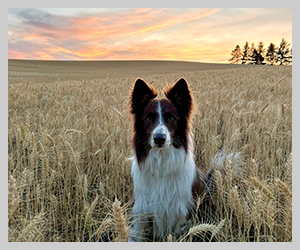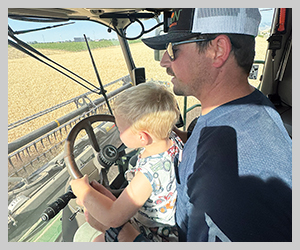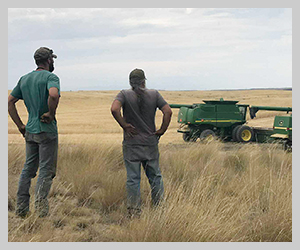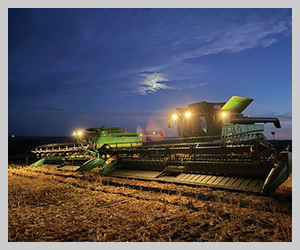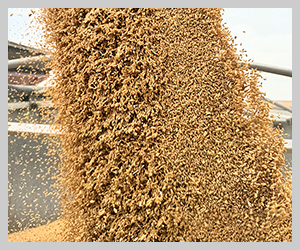Franklin County grower roots life in community, ag involvement Walt Neff, WAWG Past President 1998-99
2025October 2025
By Kevin Gaffney
For Wheat Life
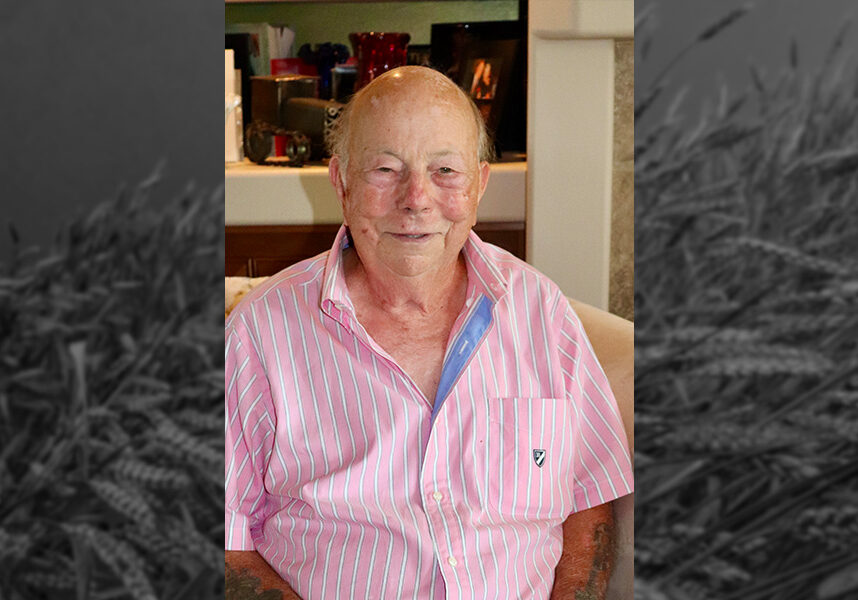
“One person can make a difference,” exemplifies Walt Neff’s philosophy on determination to accomplish goals.
The Neff family has a saying that accentuates what can be achieved by one determined person: “If you don’t think one individual can make a difference, you’ve never been in bed with a mosquito!”
It’s a given that any dryland wheat farm being operated by its fourth and fifth generations has gone through both good times and bad times. The Neff Ranch, located between Pasco and Kahlotus, provides a viable example. From surviving perennial low rainfall, sandy soil susceptible to wind erosion, and losing farm acreage to the Snake River after the construction of Lower Monumental and Ice Harbor dams, there have been hard times. Add to that surviving lean years of drought conditions and a Mormon cricket plague several decades ago.
“The Pasco-Kahlotus highway was so covered with oil from all the crickets, it was unsafe to drive on,” said Neff. “The insects were so thick, the north side of all fence posts, trees, and power poles were completely covered with layers of insects.”
Despite the challenges over the decades, Neff’s son, David, and grandson, Christopher, have the farm operating successfully in its 121st year. Neff credits conservation-conscious farming practices and innovative business methods for the farm’s survival. Neff still visits the farm regularly to keep an eye on the operation.
The Neff farm was founded by Neff’s grandfather who originally came from West Virginia to Washington state. He initially thought the soil along the Snake River was too sandy to be productive. He began his career earning income from corralling, breaking, and selling horses in the area.
“Then grandfather met and married a schoolteacher whose family owned a homestead farm,” said Neff. “He decided to stay and started building our family farm in 1904.”
The early years were rigorous and problematic. The Neffs always endeavored to conserve the soil, because wind erosion is a constant threat in their area. The farm expanded early on due to some of the neighbors failing in the years before and during the Great Depression. The Neffs were among the first to utilize fertilization and tractors on their land. Horse teams tended to bust up the sandy soil like flour.
Neff was born and raised for several years on the family farm near Pasco on the Pasco-Kahlotus Highway, attending the small, rural, Star Elementary School. Following his parent’s divorce, his mother moved Neff and his younger brother, Don, to Spokane, where he graduated from University High School in Spokane Valley. Following high school, Neff moved back to the family farm. He attended welding school at Columbia Basin College, earning a welding certificate. He worked as a boilermaker welder while still working part-time on the farm. Soon after finding employment, he was drafted by Uncle Sam and spent two years in the Marine Corps, serving in California, North Carolina, and other posts.
“Much of my military service was as a guard,” recalled Neff. “First at an ammunition depot outside of Jackson, N.C. Then, after receiving a promotion to corporal, I served as a guard at the Charleston Naval Base. Most of that duty entailed opening and closing electronic doors in the brig and transporting prisoners.”
Neff recalls being glad to finish his service and come home and jump right back onto a tractor on the farm.
Not long after returning home, Neff met his future wife, Tonie. It was evidently love at first sight, as they met in October 1971 and were married in February 1972. Still happily married 53 years later, it was obviously an excellent match. Their first home was an old farmhouse built by Neff’s grandparents. After a couple years, they moved into a newer family home on the farm.
Neff took over management of the farm from his father in the early 1990s. He and Tonie retired and moved to their home in Pasco in 2000.
“We have always treated our land with tender, loving care,” explained Neff. “We never used plows like some farmers. We employ conventional tillage, but only what is necessary to raise our crops.”
Neff used IH 150 Split-Packer grain drills with 18-inch spacing for planting winter wheat. Those drills could seed deep enough to reach germination moisture even in the drier years.
“We just prayed for the wheat to emerge quickly, because if you got a rain, the clay in the soil would often crust over, and the plants couldn’t break through,” said Neff. “We have a winter wheat-summer fallow rotation. We used to grow some dark northern spring, but soft white provides us with better yield averages.”
Over the years, Neff leased out some acreage to neighboring irrigated farms. Along with the lease income, leftover soil moisture helped the wheat crop following the potatoes.
The Neff Ranch gained regional notoriety in 1998 when the independent movie, “The Basket,” was filmed in their historic family schoolhouse. Spokane’s North by Northwest staff and the movie director, Rich Cowan, looked at many vintage schoolhouses in Eastern Washington, and the Neff Schoolhouse was chosen as the perfect site for the schoolhouse setting in the movie.
Besides growing wheat, the Neffs have a cattle operation that has helped provide an additional revenue stream over the decades. They currently have a cow-calf operation of around 80 head of mother cows.
In recent years, Neff Ranches has contracted to be the exclusive grain supplier for Blue Flame Spirits Distillery in Prosser, Wash., for whiskey production.
The list of organizations Neff has been involved with is impressive and includes the Franklin County Wheat Growers, the Washington Association of Wheat Growers, the Washington Wheat Foundation, the Washington Cattlemen’s Association, Pasco Fire District 3, Kahlotus Fire District, the Pasco Chamber of Commerce, the National Association of Wheat Growers, the Pasco Ag Show, and the Washington Ag Forestry Leadership program. The Neffs were honored with the 2024 Pioneer Award by the Pasco Agriculture Hall of Fame committee, a division of the Pasco Chamber of Commerce.
Neff first became involved with the wheat growers association in Franklin County. He then rose through the state officer chairs at the Washington Association of Wheat Growers (WAWG), following George Wood and Alex McGregor.
“Those were big shoes to fill, following those two presidents,” said Neff. “They helped prepare me for my year as president of our remarkable organization.”
One of the main controversies during Neff’s year as WAWG president was the implementation of the 1996 Farm Bill, informally known as the Freedom to Farm Act. The revision of direct payment programs included removing the link between income support payments and farm prices. It authorized seven-year production flexibility contract payments with fixed government payments, independent of current farm prices and production.
The stubble burning issue also was still smoldering during Neff’s term.
“WAWG boardmembers, working with McGregor and State Sen. Valoria Loveland, were able to negotiate an agreement with the Washington State Department of Ecology to save wheat stubble burning as a limited, permitted option,” he said.
Neff believes WAWG’s most important mission is legislative lobbying, at both state and national levels.
With the ever-shrinking number of farmers, he feels it is most critical for our ag voices and concerns to be heard at all levels of government. Neff is still active with the Washington Wheat Foundation, organizing and managing the annual fundraising auction.
The most difficult issue facing wheat farmers today are the poor market prices, concludes Neff.
“We need grain prices to come up to make farming more profitable,” said Neff. “Bushels pay the bills. If you don’t raise the bushels and get a decent price, it becomes problematic to pay the bills. I believe my son and grandson will find ways to keep our family farm successful for generations to come.”





